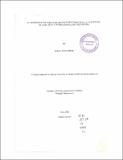| dc.description.abstract | Non-Governmental Organizations (NGOs) are classified as third sector institutions. Third sector in the sense that they are active partners in social and economic developments besides governments (public sector) and the private institutions (private sector). NGOs play a key role in all aspects of development such as health, education, water, emergency responses, and rural development e.t.c. It is recognized that, effective management of NGOs is crucial if any meaningful social and economic development is to take place therefore, strategic management is identified as the key to effective management of NGOs. It is within the concepts of strategic management that development tasks are identified and implementation framework developed to guide day-to-day management of organizations in meeting its goals. What is not clear is the extent to which strategic management is practiced by the NGO. Therefore, the purpose of this study was to investigate whether NGOs practice strategic management and if they do, to what extent and how and the challenges they face while doing so. The researcher's focus was Care Kenya International headquarter which engages in development activities within the region. The key objectives to the study were to assess the characteristics and nature of situational analysis systems adapted by Care Kenya International, nature of planning systems adapted by the organization, implementation and control systems adapted and lastly to what extent Care Kenya International practices strategic management. The study targeted senior managers and Care Kenya International employees. During sampling, the researcher used a stratified random sampling to which the total population was divided into sub-groups of international directors, management team and employees and then each sub-group treated like a simple random sample. The researcher used both convenience and purposive sampling techniques because Care Kenya International organization was conveniently accessible to the researcher and that the researcher perceived that the organization and the sample size selected would provide relevant information to study. Data collection involved use of secondary data such as journals, donor reports, magazines, newspapers, project plans, program plans, proposals, evaluation reports, management reports, while primary data involved use of the total population was divided into sub-groups of international directors, management team and employees and then each sub-group treated like a simple random sample. The researcher used both convenience and purposive sampling techniques because Care Kenya International organization was conveniently accessible to the researcher and that the researcher perceived that the organization and the sample size selected would provide relevant information to study. Data collection involved use of secondary data such as journals, donor reports, magazines, newspapers, project plans, program plans, proposals, evaluation reports, management reports, while primary data involved use of Questionnaires and interviews. The findings indicated that there was evidence of strategic management practices carried out from the initial stage of situational analysis, through implementation and control. However, there were major constrains realized while undertaking the strategic management process which included lack of proper involvement of employees and other stockholders in the process. In order to enhance improvement in the organization the study recommends adequate involvement of employees and stockholders in the strategic management process, organizational goals and objectives should be well understood by employees, the organization should invest heavily on training it staff for new challenges and a mechanism for monitoring both employee and project performance. | en_US |

